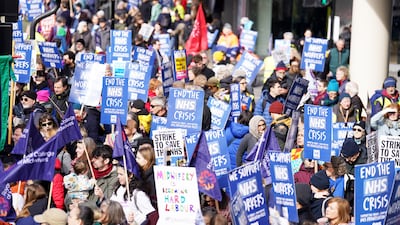Industrial action cannot become "business as usual", the National Health Service England chief executive has said, as she warned disruption from strikes is set to get worse.
NHS England boss Amanda Pritchard said patients are paying the price for the long-running wrangle about pay.
Her comments came after the government published its plan for a massive shake-up in how the NHS recruits and retains staff, promising thousands more workers in a bid to revive and reform the embattled health service.
Under the plan, the NHS is expected to employ more than 300,000 extra nurses, doctors and other health workers in England over the coming years.
Among the ideas to deal with severe staff shortages include cutting the amount of time doctors spend in medical school, driving up the number of home-grown NHS staff and ramping up apprenticeship places.
The plan, along with new retention measures, could also mean the health service has at least an extra 60,000 doctors, 170,000 more nurses and 71,000 more allied health professionals in place by 2036/37.
But the plan comes as the NHS grapples with industrial action and staff frustration at pay and conditions, as post-pandemic pressures continue.
On Sunday, Health Secretary Steve Barclay dodged questions about where funding for the £2.4 billion plan would come from, as he insisted that ministers were "making progress" on the Prime Minister's pledge to cut waiting lists.
Junior doctors will stage a five-day walkout in the middle of this month while consultants – the most senior hospital doctors – will stage industrial action two days later.
Ms Pritchard said that pay was a matter for unions and ministers, but warned: "There has been a significant amount of disruption and that is only, at the moment, going to get more significant as we hit the next round of strikes."
Nurses and ambulance workers on strike in Britain - in pictures
"It is patients that are paying the price for the fact that all sides have not yet managed to reach a resolution."
"The sooner that we can bring this to an end the better", she added.
"We can't let it become business as usual for the NHS."
She told the BBC's Sunday With Laura Kuenssberg programme that her job was to "make sure that, while that is going on, we're doing our best to support the NHS through what is now an unprecedented period of industrial action".
Appearing on the same programme, Mr Barclay declined to set out the where the new NHS investment would come from, amid questions about whether it would be funded with borrowing.
"The chancellor will announce that at the next fiscal event so I will let him set out where that will be paid for," he said.
Prime Minister Rishi Sunak and ministers hailed the significance of the plan when it was launched this week, stressing the Conservatives' commitment to the NHS.
Officials also said the plan would have a "renewed focus on retention", with more flexible working options and better career development.
It is hoped the plans, along with reforms to pension schemes, could mean up to 130,000 staff stay working in NHS settings longer.
Health leaders have also agreed that the plan needs to be revised every two years to accommodate changing needs across the service.
It comes after years of difficult and draining winters for the health service, with concerns over staffing, funding and the future of the NHS.
Former health minister Lord Bethell used the word "rationing" to describe the current approach to treatment, as millions of patients complain of lengthy delays.
"If someone has a need for an operation and you simply don't have the resources to give them what they need, then you are going beyond the important protocols of allocating scarce resources in the best way possible and you are being defined by the amount of resources that you have available," he told the BBC.
Last week it was announced nursing strikes in England are set to end after the profession’s largest trade union failed to meet the legal minimum turnout threshold – but it insisted the fight for higher pay is “far from over”.
The Royal College of Nursing said although more than 100,000 of its members voted in favour of strike action, turnout was 43 per cent, below the 50 per cent required by law for a strike to go ahead. Of those who voted, 84 per cent backed strike action.
Earlier this year, RCN general secretary Pat Cullen warned nurses could stage regular strikes until December over their long-running pay dispute.








